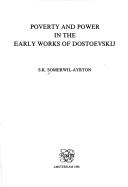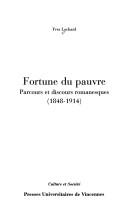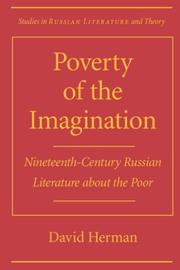| Listing 1 - 10 of 42 | << page >> |
Sort by
|
Book
Abstract | Keywords | Export | Availability | Bookmark
 Loading...
Loading...Choose an application
- Reference Manager
- EndNote
- RefWorks (Direct export to RefWorks)
eebo-0067

ISBN: 9062039804 Year: 1988 Publisher: Amsterdam : Rodopi,
Abstract | Keywords | Export | Availability | Bookmark
 Loading...
Loading...Choose an application
- Reference Manager
- EndNote
- RefWorks (Direct export to RefWorks)
Book
Year: 1883 Publisher: Paris : Henry Oriol,
Abstract | Keywords | Export | Availability | Bookmark
 Loading...
Loading...Choose an application
- Reference Manager
- EndNote
- RefWorks (Direct export to RefWorks)
Book
ISBN: 9789004465657 Year: 2022 Publisher: Leiden ; Boston : Brill,
Abstract | Keywords | Export | Availability | Bookmark
 Loading...
Loading...Choose an application
- Reference Manager
- EndNote
- RefWorks (Direct export to RefWorks)
Poverty and precarity are among the most pressing social issues of today and have become a significant thematic focus and analytical tool in the humanities in the last two decades. This volume brings together an international group of scholars who investigate conceptualisations of poverty and precarity from the perspective of literary and cultural studies as well as linguistics. Analysing literature, visual arts and news media from across the postcolonial world, they aim at exploring the frameworks of representation that impact affective and ethical responses to disenfranchised groups and precarious subjects. Case studies focus on intersections between precarity and race, class, and gender, institutional frameworks of publishing, environmental precarity, and the framing of refugees and migrants as precarious subjects. Contributors: Clelia Clini, Geoffrey V. Davis, Dorothee Klein, Sue Kossew, Maryam Mirza, Anna Lienen, Julia Hoydis, Susan Nalugwa Kiguli, Sule Emmanuel Egya, Malcolm Sen, Jan Rupp, J.U. Jacobs, Julian Wacker, Andreas Musolff, Janet M. Wilson.
Poverty in literature --- Human security in literature --- Minorities in literature
Book
ISBN: 1609383613 1609383621 9781609383626 Year: 2015 Publisher: Iowa City University of Iowa Press
Abstract | Keywords | Export | Availability | Bookmark
 Loading...
Loading...Choose an application
- Reference Manager
- EndNote
- RefWorks (Direct export to RefWorks)
Whereas previous studies of poverty and early modern theatre have concentrated on England and the criminal rogue, Poverty and Charity in Early Modern Theatre and Performance takes a transnational approach, which reveals a greater range of attitudes and charitable practices regarding the poor than state poor laws and rogue books suggest. Close study of German and Latin beggar catalogues, popular songs performed in Italian piazzas, the Paduan actor-playwright Ruzante, the commedia dell'arte in both Italy and France, and Shakespeare demonstrate how early modern theatre and performance could reveal the gap between official policy and actual practices regarding the poor. The actor-based theatre and performance traditions examined in this study, which persistently explore felt connections between the itinerant actor and the vagabond beggar, evoke the poor through complex and variegated forms of imagination, thought, and feeling. Early modern theatre does not simply reflect the social ills of hunger, poverty, and degradation, but works them through the forms of poverty, involving displacement, condensation, exaggeration, projection, fictionalization, and marginalization. As the critical mass of medieval charity was put into question, the beggar-almsgiver encounter became more like a performance. But it was not a performance whose script was prewritten as the inevitable exposure of the dissembling beggar. Just as people's attitudes toward the poor could rapidly change from skepticism to sympathy during famines and times of acute need, fictions of performance such as Edgar's dazzling impersonation of a mad beggar in Shakespeare's King Lear could prompt responses of sympathy and even radical calls for economic redistribution.
Charity in literature. --- Poverty in literature. --- Theater --- European drama --- History. --- History and criticism. --- Charity in literature --- Poverty in literature --- History --- History and criticism

ISBN: 284292035X Year: 1998 Publisher: Paris : Presses Universitaires de Vincennes,
Abstract | Keywords | Export | Availability | Bookmark
 Loading...
Loading...Choose an application
- Reference Manager
- EndNote
- RefWorks (Direct export to RefWorks)

ISBN: 0810116928 0810121301 Year: 2001 Publisher: Evanston, Illinois : Northwestern University Press,
Abstract | Keywords | Export | Availability | Bookmark
 Loading...
Loading...Choose an application
- Reference Manager
- EndNote
- RefWorks (Direct export to RefWorks)
The primal scene of all nineteenth-century Western thought might well be the moment an observer gazed at someone poor, most commonly on the streets of a great metropolis, and wondered what the spectacle meant in human, moral, political, and metaphysical terms. In Russia, where so much of the population was impoverished, the moment held special significance. David Herman examines how Russian writers portrayed this poverty and what their portrayal reveals and articulates about core values of Russian culture.Focussing on specific texts but addressing the literary tradition as a whole, Herman begins with Karamzin's immensely popular story "Poor Liza", the first in a sequence of poverty narratives that self-consciously address one another. He then considers Pushkin's "Egyptian Nights"; Gogol's "Overcoat", Petersburg tales, and Selected Passages; and Dostoevsky's Idiot and 1880 "Pushkin speech".With a series of innovative readings, Poverty of the Imagination teases out a Russian discourse on lack which owes its peculiar richness to an insistence on solving simultaneously problems of social justice, national identity, and the ethics of the human imagination. As prominently as poverty figures in Russian literature, this is the first sustained analysis of its literary, conceptual, and cultural implications. As such, it deepens our understanding and appreciation of some of the most widely read literature of all time.
Russian literature --- Poor in literature. --- Poverty in literature. --- History and criticism.
Book
ISBN: 9780754668824 Year: 2010 Publisher: Farnham Ashgate
Abstract | Keywords | Export | Availability | Bookmark
 Loading...
Loading...Choose an application
- Reference Manager
- EndNote
- RefWorks (Direct export to RefWorks)
Literature and society --- Poverty in literature --- Social science literature --- Sociology, Urban
Book
ISBN: 3846744476 Year: 2008 Publisher: Paderborn : Wilhelm Fink Verlag,
Abstract | Keywords | Export | Availability | Bookmark
 Loading...
Loading...Choose an application
- Reference Manager
- EndNote
- RefWorks (Direct export to RefWorks)
Armut, ein globales und menschheitsgeschichtliches Phänomen, zählt zu den drängendsten Problemen der Gegenwart. Doch jenseits politischer Diskurse und medialer Skandalisierungen scheinen Not, Mangel und Ausgrenzung kaum ein ästhetisches Recht beanspruchen zu können. Die Gleichsetzung von ästhetischem und materiellem Vermögen wird indes bereits in der Antike kritisch reflektiert. Dass auch in der deutschsprachigen Literatur unschöne Armut und schöne Literatur nicht notwendig im Widerspruch zueinander stehen, belegen die Autorinnen und Autoren des Bandes. Die Beiträge rücken die produktive Spannung zwischen den materiellen Bedingungen und ihren ästhetischen Transformationen als vielgestaltige Ökonomien der Armut in den Blick. Nicht zuletzt stellt sich mit der Frage nach den sozialen Verhältnissen in der Literatur auch diejenige nach einem social turn in den Kulturwissenschaften.
Poverty in literature. --- Poor in literature. --- Social classes in literature. --- German literature --- History and criticism.

ISBN: 392183404X 9783921834046 Year: 1979 Volume: 4 Publisher: Göttingen: Gratia,
Abstract | Keywords | Export | Availability | Bookmark
 Loading...
Loading...Choose an application
- Reference Manager
- EndNote
- RefWorks (Direct export to RefWorks)
Poverty in literature --- Pauvreté dans la littérature --- Sachs, Hans, --- Philosophy --- Sachs, Hans --- -Philosophy --- Poverty in literature. --- Philosophy. --- Pauvreté dans la littérature --- Saks, Gans, --- Sachs, Johannes, --- Sachs, Hans, - 1494-1576 - Philosophy --- Sachs, Hans, - 1494-1576
| Listing 1 - 10 of 42 | << page >> |
Sort by
|

 Search
Search Feedback
Feedback About UniCat
About UniCat  Help
Help News
News